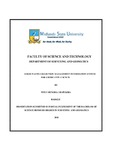Please use this identifier to cite or link to this item:
https://cris.library.msu.ac.zw//handle/11408/3511Full metadata record
| DC Field | Value | Language |
|---|---|---|
| dc.contributor.author | Chapukira, Titus Munoda | - |
| dc.date.accessioned | 2019-04-02T10:57:24Z | - |
| dc.date.available | 2019-04-02T10:57:24Z | - |
| dc.date.issued | 2018 | - |
| dc.identifier.uri | http://hdl.handle.net/11408/3511 | - |
| dc.description.abstract | Solid waste alludes to all materials that are not prime items, for which the individual creating the material has no further use in terms of his or her own motivations for generation and utilization. In developing countries, Zimbabwe included, municipal authorities rely on poor methods and techniques in waste collection administration which are subjective and tend to increase operational costs of solid waste collection activities. Instead of maintaining vibrant information management systems for solid waste collection to efficiently utilise the available resources, much emphasis is directed towards blaming the shortage of financial and human resources as well as the vehicles and equipment for the rapid depletion of waste collection levels. The declination of the solid waste collection results in unlawful open dumping and burning of solid waste which has negative ecological, social and economic effects. The absence of optimized information management systems for solid waste collection by the municipal authorities is causing solid waste collection to be costly and inefficient resulting in the failure to adhere to timeous collection of solid waste. There are likewise no efficient methods of communication between residents and municipal authorities. This study presents an optimised management information system to help in the planning, management and scheduling both human resource and refuse trucks. The system enabled the monitoring of waste collection activities in near real time as well as facilitating for the generation of optimum routes. The optimum routes were generated after considering the road elevation changes, degree of the roughness of the road surface and the traffic congestion associated with a particular road network. This in turn significantly reduces fuel consumptions and time delays in delivering waste collection services to the residents. The system enabled the visualisation of the of the animation of a waste collection vehicle in transit on an optimum route. Furthermore, the system empowered residents to participate in the collection systems through conveying their contributions, suggestions and complaints direct to the administration via the web. However, there is need for the system to be integrated with RFID`s and GSM modems so as to achieve enhanced capabilities that forms the basis of a smart waste collection system. | en_US |
| dc.language.iso | en | en_US |
| dc.publisher | Midlands State University | en_US |
| dc.subject | Solid waste | en_US |
| dc.subject | Waste collection administration | en_US |
| dc.title | Solid waste collection management information system for Gweru City Council | en_US |
| item.fulltext | With Fulltext | - |
| item.grantfulltext | open | - |
| item.languageiso639-1 | en | - |
| Appears in Collections: | Bsc.honours In Surveying And Geomatics | |
Files in This Item:
| File | Description | Size | Format | |
|---|---|---|---|---|
| r143422z Titus Chapukira.pdf | Full Text | 3 MB | Adobe PDF |  View/Open |
Page view(s)
642
checked on Feb 23, 2026
Download(s)
982
checked on Feb 23, 2026
Google ScholarTM
Check
Items in MSUIR are protected by copyright, with all rights reserved, unless otherwise indicated.



